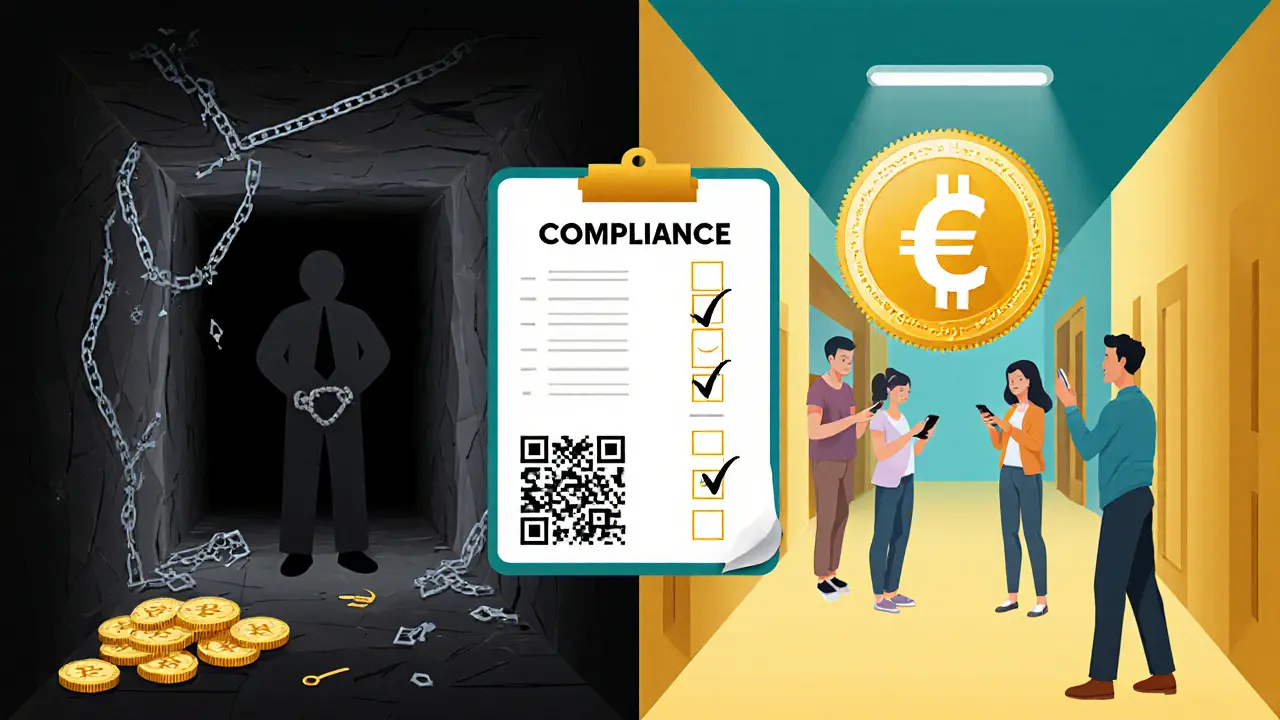China Crypto Legal Status Checker
Check Activity Legality
Select a cryptocurrency activity to check its legal status in mainland China as of June 1, 2025.
Enter an activity and click "Check Legal Status" to see if it's legal in China as of 2025.
When you hear "China" and "crypto" together, the first image that pops up is a massive crackdown. But what does that actually mean for anyone wanting to buy, trade, or even hold a digital coin inside mainland China today? The short answer is: you can’t. As of June12025, the People’s Bank of China (PBOC) declared a full prohibition on all cryptocurrency activities - trading, mining, and even personal ownership. Below we break down the legal framework, the agencies that enforce it, what the penalties look like, and why the government still backs its own digital currency, the e‑CNY.
What the Law Says
Cryptocurrency regulation in China is a legal regime that classifies any transaction, mining operation, or personal holding of decentralized digital assets as illegal financial activity. The rule, issued by the People's Bank of China on May302025, makes it a criminal offence to engage in any crypto‑related conduct.
The decree mandates that every financial institution - banks, payment providers, and even fintech apps - must block crypto‑related payments and report suspicious activity to law‑enforcement bodies. Non‑compliance can trigger asset seizures, fines, and imprisonment.
Key Agencies and Their Roles
- Ministry of Public Security - leads anti‑money‑laundering (AML) investigations and prosecutes crypto‑related crimes.
- Cyberspace Administration of China - monitors online platforms, blocks crypto content, and forces internet service providers to filter prohibited sites.
- Ministry of Industry and Information Technology - oversees the shutdown of mining farms and coordinates hardware inspections.
- State Administration of Foreign Exchange - enforces capital‑control rules that prevent cross‑border crypto transfers.
These bodies operate under a coordinated working mechanism that blends digital surveillance with on‑the‑ground inspections, creating a 24/7 monitoring network for any crypto‑related signal.
Timeline of the Ban
- December52013 - Banks barred from processing Bitcoin payments.
- April12014 - PBOC orders closure of Bitcoin trading accounts.
- September302017 - Nationwide ICO ban and shutdown of domestic exchanges.
- January2018 - Massive miner exodus as authorities clamp down on mining farms.
- June2021 - Explicit ban on crypto mining in several provinces.
- September242021 - De‑facto ban on all digital tokens, including Bitcoin.
- June12025 - Full criminalization of ownership, trading, and mining.
Each step tightened the net, moving from soft restrictions to a hard‑line criminal framework.
Penalties You Need to Know
The law treats crypto violations as money‑laundering offenses. Typical sanctions include:
- Up to threeyears imprisonment for first‑time offenders.
- Fines ranging from 50,000 to 200,000yuan (≈US$7,000‑$28,000).
- Asset seizure of any crypto holdings and related equipment.
- Criminal records that affect future employment and travel.
A landmark case in August2024 saw a Beijing court sentence a trader to 3.5years and a 40,000yuan fine for moving USDT tied to fraud. The ruling introduced a "should have known" standard, meaning ignorance isn’t a defense if the transaction’s illicit nature is apparent.
Why the Ban Coexists with the e‑CNY
China’s crackdown targets private, decentralized tokens, but the state still pushes its own digital fiat - the e‑CNY (digital yuan). The rationale is two‑fold:
- Financial stability: A sovereign digital currency can be monitored and controlled, eliminating the anonymity that fuels money‑laundering.
- Capital control: e‑CNY allows the People's Bank to track cross‑border flows, preserving the country’s foreign‑exchange regime.
In practice, the e‑CNY operates under a centralized ledger managed by the PBOC, offering many of the convenience benefits of crypto without the regulatory headache.
Comparison: Crypto Ban vs e‑CNY
| Aspect | Private Cryptocurrencies (e.g., Bitcoin, Ethereum) | e‑CNY (Digital Yuan) |
|---|---|---|
| Legal Status (2025) | Illegal - criminal penalties for ownership, trading, mining. | Legal - issued and regulated by the PBOC. |
| Control Mechanism | Decentralized, no central authority. | Centralized ledger, real‑time monitoring. |
| Use Cases Allowed | None within mainland China. | Payments, transfers, government subsidies, retail. |
| AML/KYC Requirements | Not applicable - activity prohibited. | Mandatory KYC for all wallet accounts. |
| Cross‑Border Flow | Strictly blocked; overseas exchanges banned. | Limited to approved international pilots. |

How Businesses Can Stay Compliant
If your company operates in China, the compliance checklist is simple yet unforgiving:
- Remove any crypto‑related services from your product roadmap.
- Implement AML software that flags keywords like "BTC", "wallet", "exchange" in transaction descriptions.
- Train staff to recognize and report suspicious crypto activity to the Ministry of Public Security.
- Audit all offshore subsidiaries to ensure they aren’t facilitating crypto services to Chinese residents.
- Adopt the e‑CNY API for any digital payment features you wish to keep.
Failure to follow these steps can lead to immediate shutdown orders and criminal investigations.
Is There Any Outlook for Softening?
In July2025, a Shanghai State‑Owned Assets Supervision meeting discussed "strategic responses to stablecoins and digital currencies." While no policy shift was announced, the fact that the topic made it onto the agenda hints at internal debate. Analysts suggest any future relaxation would likely focus on regulated stablecoins that can be easily monitored, not on permissionless tokens.
For now, the safest bet is to treat all private crypto as off‑limits within China’s borders.
Quick Takeaways
- All crypto activities are criminal offenses in mainland China as of June12025.
- The PBOC, Ministry of Public Security, Cyberspace Administration, and MIIT enforce the ban.
- Penalties include prison time, hefty fines, and asset seizures.
- China promotes its own digital yuan (e‑CNY) as a legal alternative.
- Compliance requires removing crypto services, AML monitoring, and reporting to authorities.
Frequently Asked Questions
Is it illegal to own Bitcoin in China?
Yes. Since the May302025 PBOC decree, personal ownership of Bitcoin or any other decentralized token is classified as a criminal act, punishable by up to three years in prison and fines.
Can foreign exchanges serve Chinese customers?
No. The decree bans overseas crypto exchanges from providing any service to residents of mainland China. Violations lead to asset freezes and criminal charges for both the provider and the user.
What happens if a Chinese bank accidentally processes a crypto transaction?
The bank must immediately report the incident to the Ministry of Public Security. The transaction will be reversed, and the institution can face fines up to 200,000yuan and administrative penalties.
Is the e‑CNY subject to the same restrictions?
No. The digital yuan is a state‑issued currency, fully legal and encouraged for everyday payments. It operates under strict KYC and AML rules, but it is not prohibited.
Could the crypto ban change in the near future?
There are internal discussions about regulated stablecoins, but no official policy shift has been announced. Until a new law is published, the ban remains fully enforced.



 Finance
Finance





Ben Parker
October 11, 2025 AT 08:32Looks like Beijing just tightened the noose on anyone even thinking about crypto 🚫💰.
Daron Stenvold
October 17, 2025 AT 20:06The recent decree marks a decisive turn in China's financial sovereignty.
By criminalizing every facet of private cryptocurrency, the state sends a crystal‑clear message that decentralization is incompatible with its regulatory ethos.
This change does not merely affect traders; it reaches casual holders, developers, and even foreign exchanges that once serviced Chinese users.
In effect, the legal framework now equates owning a token with illicit activity, elevating it to a punishable offense.
The penalties-up to three years imprisonment and hefty fines-underscore the seriousness of the crackdown.
Such draconian measures also serve as a deterrent, signaling zero tolerance for any bypass attempts.
Meanwhile, the People's Bank of China has been championing the e‑CNY, a sovereign digital currency that fits neatly within its oversight mechanisms.
By promoting the e‑CNY, the government offers a state‑controlled alternative that sidesteps the anonymity prized by private crypto.
Analysts warn that this dual strategy could tighten capital controls while still fostering digital payments innovation.
International observers note the move may push crypto activity offshore, but domestic participants will face severe legal repercussions.
Law‑enforcement agencies are now equipped with advanced monitoring tools to track suspicious transactions.
Financial institutions are mandated to flag any crypto‑related activity, creating a comprehensive surveillance net.
Businesses operating in China must purge crypto services from their offerings or risk shutdown.
In summary, the 2025 regulation cements a full prohibition, effectively erasing the legal space for private digital assets within the mainland.
Only the state‑issued digital yuan remains a viable, regulated digital payment method.
hrishchika Kumar
October 24, 2025 AT 07:39It’s heartbreaking to see such creativity crushed under red tape, especially when the tech could have empowered so many.
Yet I understand the government’s desire for control; the balance between innovation and oversight is a tightrope.
For those of us watching from outside, the message is crystal clear: adapt or go underground.
Nina Hall
October 30, 2025 AT 18:12Hey folks, this is a good reminder to keep an eye on regulatory shifts – they happen fast and can change the game overnight! 🌟
Manas Patil
November 6, 2025 AT 05:46From a compliance standpoint, the risk matrix just got a whole lot steeper; any crypto‑related feature now flags a high‑severity alert in our AML suite, demanding immediate remediation.
Annie McCullough
November 12, 2025 AT 17:19Well, that’s just great… 🙄
Carol Fisher
November 19, 2025 AT 04:52China is defending its economic sovereignty; anyone who cries about "freedom" is just ignoring the bigger picture 😤.
Melanie Birt
November 25, 2025 AT 16:26Exactly. The PBOC’s stance is consistent with its mandate to prevent money‑laundering and protect citizens from speculative loss. Institutions should therefore conduct a full audit of crypto‑related services and halt any that could expose them to legal risk.
Lady Celeste
December 2, 2025 AT 03:59The crackdown feels like a plot twist nobody wanted.
Ethan Chambers
December 8, 2025 AT 15:32One might argue that this is merely a veneer for tightening geopolitical hegemony, yet the legal language is unambiguous and merciless.
Lena Vega
December 15, 2025 AT 03:06Compliance teams need to act now.
Mureil Stueber
December 21, 2025 AT 14:39Agreed – the first step is to scrub all product roadmaps of crypto‑related features and update your KYC/AML policies to reflect the latest Chinese directives.
Emily Kondrk
December 28, 2025 AT 02:12What they don’t tell you is that the surveillance grid is already watching every transaction, and the next big scandal will involve a hidden backdoor in the e‑CNY system.
debby martha
January 3, 2026 AT 13:46Looks like another boring update from the regulators.
Leo McCloskey
January 10, 2026 AT 01:19Indeed-this is yet another instance of the authorities tightening the reins, effectually pushing any remaining crypto enthusiasm into the shadows-where it will continue to fester unnoticed, potentially creating even greater risks for the unregulated market!!!
arnab nath
January 16, 2026 AT 12:52They’re basically saying: stay away or face jail time.
Nathan Van Myall
January 23, 2026 AT 00:26I’m curious how this will affect foreign exchanges that still have Chinese users on their platforms.
Ted Lucas
January 29, 2026 AT 11:59Great point! 🌟 If you’re a crypto business, double‑check that you’ve fully disabled any China‑related services-otherwise you’re looking at a serious legal nightmare.
Jacob Moore
February 4, 2026 AT 23:32Hey all, just a heads‑up: if you’re building anything crypto‑related, make sure your compliance checklist is updated for the Chinese market.
Laura Myers
February 11, 2026 AT 11:06Seriously, the drama here is next‑level-one day you’re dealing with Bitcoin, the next you’re forced to rewrite your entire platform for a state‑issued token. Talk about a plot twist!
Anjali Govind
February 17, 2026 AT 22:39Anyone else think the e‑CNY could become a model for other governments trying to control digital finance?